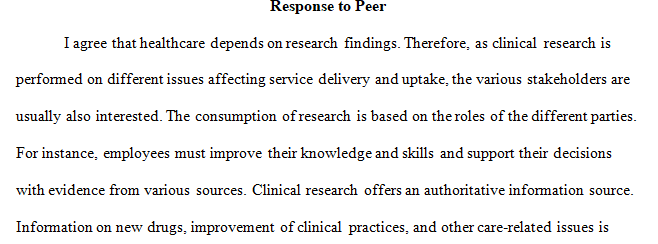Clinical practice areas vary with time, and there may be instances when certain interest groups try to influence the way clinical care
Clinical practice areas vary with time, and there may be instances when certain interest groups try to influence the way clinical care
Introduction
Clinical practice areas vary with time, and there may be instances when certain interest groups try to influence the way clinical care is provided or how services are delivered. When ground-breaking new study results are revealed, this may change how clinical services and care delivery are provided. This article will examine which tool groups could be interested in clinical research results and how they might respond to new discoveries.
The medical professionals who use the results to direct their practice and services are among the most influential interest groups concerning clinical research findings. New study results in respective domains are most attractive to physicians, nurses, pharmacists, and other healthcare professionals, emphasizing how the findings could affect patient care (Portney, 2020). These specialists are the most knowledgeable about the literature in the discipline, making them more aware of any recent developments in their fields. They could quickly implement any discoveries that are helpful for their profession and comment on new research and their working practices.
Hospitals and other healthcare organizations represent another vital interest group in clinical research results. Innovative study results directly affect how services are rendered and the nature of the care supplied. Discoveries that may enhance patient care and save expenses are likely of great interest to hospitals and other organizations (Snoswell et al., 2020). For instance, the hospital may be eager to embrace the new standard as quickly as possible if emerging research indicates that a certain kind or combination of medications is more effective than the current standard of treatment.
New study discoveries can be of interest to government organizations. Governmental bodies may be entrusted with enacting new laws, rules, or policies to guarantee patient safety and the standard of care, depending on the nature of the study results (Battaglio et al., 2019). Federal and state officials may also look into the study results to see whether any practices or methods are illegal or if new laws are required to safeguard patient safety and privacy.
Lastly, new study results in clinical practice domains may also interest advocacy organizations, non-profits, and medical foundations. These organizations could be trying to figure out how to utilize the papers to encourage higher standards of patient care, safety, and health outcomes for underrepresented groups (Andrews & Wright., 2019). A group or community may profit from a novel study discovery, and organizations may be eager to use the results to improve treatment and health outcomes.
Conclusion
In conclusion, various distinct interest groups may become engaged when brand-new, paradigm-shifting research results are released in clinical practice fields. Medical professionals, hospitals and other healthcare facilities, governmental entities, and advocacy groups are most likely interested. The groups’ responses might vary from immediate acceptance to more deliberate discussion, depending on the nature of the study results. Eventually, the response of interested parties may significantly influence how the new study results are incorporated into clinical practice and service delivery.
References
Andrews, T., & Wright, K. (2022). The frontiers of new psychedelic therapies: A survey of sociological themes and issues. Sociology Compass, 16(2), e12959.
Battaglio Jr, R. P., Belardinelli, P., Bellé, N., & Cantarelli, P. (2019). Behavioral public administration ad fontes: A synthesis of research on bounded rationality, cognitive biases, and nudging in public organizations. Public Administration Review, 79(3), 304-320.
Portney, L. G. (2020). Foundations of clinical research: applications to evidence-based practice. FA Davis.
Snoswell, C. L., Taylor, M. L., Comans, T. A., Smith, A. C., Gray, L. C., & Caffery, L. J. (2020). Determining if telehealth can reduce health system costs: scoping review. Journal of medical Internet research, 22(10), e17298.
Requirements: 250 words
Nursing
Answer preview for the paper on ‘Clinical practice areas vary with time, and there may be instances when certain interest groups try to influence the way clinical care’

APA 367 words
Click the purchase button below to download full answer…….
